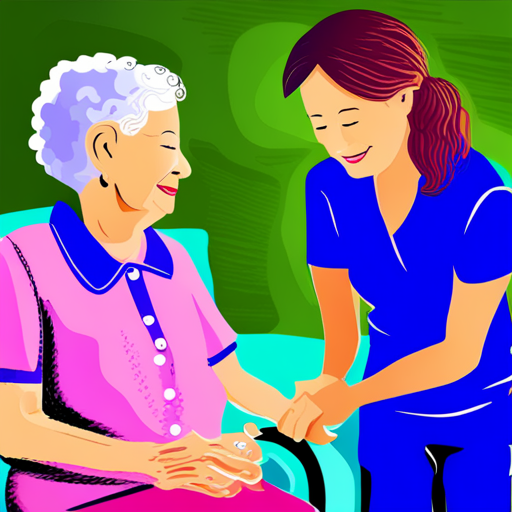Exploring Senior Care Options: Residential Facilities, Assisted Living, Nursing Homes, Home Care
With numerous senior care options available, making the right choice can be daunting. In this comprehensive guide, we'll explore various senior care facilities, discuss the concept of aging in place, and provide guidance on finding the right care for your aging loved one.

As our loved ones grow older, ensuring their well-being and comfort becomes a top priority. With numerous senior care options available, making the right choice can be daunting. In this comprehensive guide, we'll explore various senior care facilities, discuss the concept of aging in place, and provide guidance on finding the right care for your aging loved one. Buckle up for an informative journey through the world of senior care!
Short Summary
- Understand different types of senior care facilities and their services.
- Evaluate needs, compare costs, and establish a support network for successful aging in place.
- Plan ahead when transitioning to assisted living or nursing homes with packing, transportation & storage considerations.
Understanding Different Types of Senior Care Facilities

Navigating the landscape of senior care can be overwhelming, but understanding the different types of facilities available can help you make an informed decision. From board and care homes to assisted living facilities, nursing homes, and continuing care retirement communities, each option caters to unique needs and preferences, offering a range of services tailored to ensure the well-being of aging adults. Then you have the issue of who will pay for these alternative living options. If you have purchased a long term care insurance policy, you will need to contact your insurance agent to discover what the plan covers, as well as the expectations for notification to use those benefits.
Let's delve deeper into each of these senior care facilities, comparing their offerings and highlighting their differences to help you determine the best senior care option to fit for your loved one. Whether it is one of the types of home health care providers to a nursing home and everything in between, we have you covered.
Board and Care Homes
Board and care homes offer a homelike environment for seniors who require assistance with daily activities but not skilled nursing care. Typically accommodating four to six residents, these small, licensed family homes provide personalized care and attention in a more intimate setting.
However, it's essential to note that board and care homes might not be suitable for those with more complex medical needs, as they may not offer the same level of medical care or amenities as other senior care facilities. That said, they are often a more affordable option for seniors seeking a cozy and nurturing environment. In some states board and care homes are licensed under the assisted living regulations.
Assisted Living Facilities

Assisted living facilities are designed for individuals who require support with daily activities but don't need the level of care provided in a nursing home. These facilities offer a range of services, such as meals, assistance with personal care, housekeeping, and social and recreational activities. Assisted living facilities are based on a social model, not a medical model. When a person requires any type of medical care, such a testing blood for sugar, or having blood pressures monitored, you will be required to pay for those services. A higher level of care, such as after a discharge from the hospital will require care provided by a home care provider. This skilled need will be covered under Medicare.
Assisted living residents can enjoy the benefits of a secure and supportive community, where they have access to common areas for socialization and intellectual stimulation. However, the arrangements can differ depending on state regulations, so it's crucial to research local options when considering an assisted living facility for your loved one.
If you are considering Assisted Living facilities, we have created a checklist for you to use to determine the best choice for your family member. Look for it in the Resource Section of caregiver relief.
Nursing Homes

Nursing homes are specialized facilities that provide 24-hour medical care and assistance with everyday activities for seniors with ongoing physical or mental conditions and complex medical care. These facilities offer a higher level of medical care compared to most assisted living facilities elsewhere, making them an ideal choice for seniors with more complex health needs.
In addition to nursing care, skilled nursing facilities and homes offer rehabilitation services such as physical, occupational, and speech therapy. To find and compare nursing homes in your vicinity, Medicare's Nursing Home Compare is a valuable resource. After a three day hospital stay, Medicare will pay for skilled care. If there are no skilled needs, the care is considered custodial. Medicare does not cover custodial care, so the cost of a nursing home will be private pay, long term care insurance or, if you qualify, Medicaid will cover the cost of care.
If you are considering A nursing home, we have created a checklist for you to use to determine the best choice for your family member. Look for it in the Resource Section of caregiver relief.
Continuing Care Retirement Communities (CCRCs)

Continuing Care Retirement Communities (CCRCs) provide a unique approach to senior care by using many facilities and offering a range of services in one location. These communities cater to seniors' evolving needs by providing independent housing, assisted living, and skilled nursing care all within the same facility. Some offer the best home care team provided by staff the develops a relationship with your loved one.
As residents' needs change, they can transition from independent living to assisted living or receive home care in their independent living unit. This ensures that seniors have access to the appropriate level of care throughout this important part of their aging journey, without the stress of relocating to a different facility.
To explore facility-based long-term care options, you can contact your local Area Agency on Aging or use the Eldercare Locator.
If you are considering a Continuing Care Retirement Community, we have created a checklist for you to use to determine the best choice for your family member. Look for it in the Resource Section of caregiver relief.
Aging in Place: Planning for the Future

Aging in place refers to staying in one's residence and community securely, autonomously, and conveniently, regardless of age, income, or ability level. As the US's aging population rises, it presents social, economic, physical, emotional, and medical challenges for seniors and their families. To ensure a comfortable and secure future, it's essential to start planning early and anticipate potential changes and challenges, including assistance with daily activities and the need for support networks.
In the following sections, we'll discuss when to start planning, how to face challenges and adapt, and the importance of support networks for seniors aging in place.
When to Start Planning

The sooner you start planning for senior care, the better. Early planning can ensure that your loved one receives the highest quality care available and that their needs are adequately met. Moreover, it can reduce stress and provide peace of mind for both the senior and their family.
National Long Term Care Awareness Month in November is an excellent opportunity to discuss the important considerations when organizing elderly care. Anticipating senior care needs and researching various care options, such as residential facilities, assisted living, and nursing homes, can help you make informed decisions before a health emergency arises.
I recommend you take Caregiver Relief's New to CareGiving course. Then, take the How to be a Patient Care Advocate Course to prepare for aging in place and beyond.
Facing Challenges and Adapting

Senior care planning involves various considerations such as financial constraints, identifying the appropriate type of care, guaranteeing quality of care, and understanding healthcare options. Financial considerations may include the cost of care, insurance coverage availability, and the ability to pay out of pocket.
To determine the most suitable type of care for older adults, it's essential to research various care options, evaluate the needs of the elderly individual, and solicit the advice of experts. Ensuring quality of care involves researching the facility or provider, visiting the facility or provider, and asking questions regarding the care provided.
Caregiver relief has a care management platform that will support your loved ones throughout their aging journey. We offer a centralized place to manage your loved ones care, with the entire care team. We also offer caregiving coaching and geriatric care management, if needed.
Importance of Support Networks

Having a support network is crucial when planning for senior care, as it offers seniors emotional and practical assistance, helping them remain connected to their community and maintain a sense of independence. Support networks can also assist caregivers by providing them with assistance and recognition. In the How to Be a Patient Care Advocate course we show you how to develop a team to support the primary caregiver.
Emotional support through companionship, understanding, and attentive listening can help seniors feel less isolated and more connected to their loved ones. Practical assistance with tasks like grocery shopping, transportation, and light housekeeping, can make a significant difference in a senior's quality of life, allowing them to age in place more comfortably.
Home Care Services: Supporting Seniors at Home
Home care services provide seniors with assistance at home, offering benefits such as improved physical health, intellectual stimulation, social connection, and slowing cognitive decline. These services can be particularly helpful for seniors who prefer to age in place but need extra support with daily activities.
In the next sections, we'll explore the benefits of home care services and offer guidance on finding the right home care provider to ensure that your aging loved one receives the support they need within the comfort of their own home.
Benefits of Home Care
Home care services offer a personalized care plan tailored to seniors' individual requirements and preferences. This personalized care can significantly improve a senior's quality of life, as it allows them to maintain their independence while receiving the necessary support.
Moreover, home care services provide companionship, which can help diminish feelings of loneliness and isolation often experienced by seniors living alone. By offering emotional support and practical assistance, home care services can ensure that seniors age safely and live independently and comfortably.
Finding the Right Home Care Provider

To identify the most suitable home care provider, it's crucial to evaluate the requirements of the senior, examine the available choices, and consider the cost. Gathering referrals from family, friends, and other reliable sources is an excellent place to begin when searching for a suitable provider.
When evaluating your requirements, consider the type of care needed, the amount of care required, and the expense of care. It's also essential to verify the provider's credentials, certifications, and reputation by reviewing their website or contacting them directly.
There are two types of home care. Skilled care, paid by Medicare, provides intermittent and limited visits.
In home care is paid out of pocket by the senior, or it may be covered under a long term care policy.
Assisted Living: A Comprehensive Guide

Assisted living is a long-term care option for seniors who need help with daily activities, meals, socialization, and community in a safe residential setting. These facilities provide personalized care, ensuring the well-being of aging adults in a nurturing and supportive environment.
In the following sections, we'll compare assisted living to other senior care types, discuss how to assess your loved one's needs, and navigate the cost of assisted living, providing you with a comprehensive understanding of this popular senior care option.
Comparing Assisted Living to Other Senior Care Types
While assisted living facilities offer some comparable services to other senior care types, there are noteworthy differences that set them apart. Assisted living provides support with daily activities and a secure living environment, whereas independent living communities focus on transportation, security, and recreational activities without offering health care services.
Nursing homes, on the other hand, provide 24-hour medical care and assistance with everyday activities, catering to seniors with more complex health needs. Hospice care is specifically designed for individuals with terminal illnesses, making it distinct from assisted living facilities that focus on providing assistance with daily living activities.
Assessing Your Loved One's Needs

When evaluating your loved one's needs for assisted living, consider factors such as behaviors, chronic illnesses, communication abilities, dietary requirements, daily activities, medical history, current health issues, and the need for assistive technologies. Assessing these factors can help you determine the level of care required and the most suitable senior care facility for your loved one.
As you consider different facilities, it's essential to take into account the associated costs and payment options. Some government programs, such as Medicaid, may provide financial assistance for eligible seniors, while savings, Social Security, retirement funds, and home equity can also be utilized to cover assisted living costs.
Navigating the Cost of Assisted Living
The median monthly cost of assisted living in the US is approximately $4,000, which can be a significant financial burden for many families. However, there are various options available to help manage these costs, such as government programs like Medicaid, which provides financial assistance for eligible low-income seniors.
Other methods to cover assisted living costs include utilizing savings, Social Security, retirement funds, and home equity. By researching and evaluating different payment options, you can ensure that your loved one receives the care they need without causing undue financial stress on your family.
Making the Transition to Assisted Living or Nursing Homes

Making the transition to assisted living or nursing homes can be a challenging process for many seniors, and their families. From preparing for the move to helping your loved one adjust to their new environment, there are several steps involved in ensuring a smooth and stress-free transition.
In the following sections, we'll offer guidance on preparing for the move, discussing the transition with your loved one, downsizing before moving, getting moving help, and easing the transition to their new home.
Preparing for the Move
Before making the move to an either assisted living community or nursing home, it's crucial to plan ahead and consider factors such as packing, transportation, and storage. Hiring a senior living moving specialist with experience, a good reputation, and reasonable costs can make the process easier and more efficient.
As you downsize and prepare for the move, consider the amount of space your loved one will have in their new living environment, request a floor plan and dimensions of the apartment, and think about bringing along a few treasured items to make the new space feel like home.
Settling In and Adjusting
Helping your loved one settle in and adjust to their new living environment is essential for a successful transition. Encourage them to get to know the staff and other residents, familiarize themselves with the residential facility itself and its rules, and allow themselves time to adjust.
Various support services, such as counseling services, support groups, and activities designed to help residents acclimate, can be invaluable during this time. Maintaining close relationships with family and friends can also provide emotional support and a sense of connection for your loved one, helping to alleviate feelings of loneliness and isolation during this challenging period.
Summary
Navigating the world of senior care can be overwhelming, but understanding the various options available and how they cater to different needs can help you make the best decision for your loved one. From board and care homes to assisted living, nursing homes, and continuing care retirement communities, each type of facility offers unique benefits and services. Remember to plan early, adapt to challenges, and maintain a strong support network to ensure the well-being and comfort of your aging loved one. By staying informed and proactive, you can help make their golden years truly golden.
Frequently Asked Questions
What are 4 types of caregivers?
Caregivers come in many different forms. Four of the most common types are family caregivers, professional caregivers, geriatric care managers, and home care aides. Each type is essential to providing quality care for people who are unable to take care of themselves due to age, disability, or other health-related issues.
With the right support and resources, caregivers can help individuals live healthier and more fulfilling lives.
What is a senior caregiver?
A senior caregiver is a compassionate, non-medical professional who helps an elderly person remain independent in their own home. They provide assistance with daily living activities such as dressing, bathing and personal care, as well as offering companionship and emotional support.
Senior caregivers also have the knowledge and training to recognize signs of physical or cognitive decline and can alert family members if needed. They will address the aging issues of limited mobility and provide emotional support and assistance when needed, encouraging independence versus dependence on another person. Senior caregivers improve the quality of life as an aging person requires different levels of care. They are an important part in the long term care industry.
What is the role of senior care?
The role of senior care is to provide a safe and supportive environment for elderly or infirm people in residential care, day care establishments, or their own homes. This includes activities of daily living providing personal care services such as bathing, grooming, dressing and toileting, performing basic household tasks like food preparation, shopping and housekeeping, and managing medications and medical appointments and putting safety protocols in place.
What is the role of a geriatric care manager?
If you or a loved one are finding it difficult to keep up with everyday life, you may benefit from the services of a geriatric care manager. Think of them as a professional relative who can assist with identifying needs and finding ways to make life easier. These specially trained experts work with you to create a long-term care plan and connect you with the resources you need.
One of the greatest benefits of working with a geriatric care manager is that they can be your go-to resource when family members live far apart. They can check in with you periodically to ensure your needs haven't changed and can be your advocate in coordinating medical services and selecting care personnel. Plus, they address emotionally difficult issues and provide caregiver stress relief.
If you're struggling to navigate complex topics and evaluate in-home care needs or other living arrangements, enlist the help of a geriatric care manager. They can provide you with the support you need to live your best life.
All of our guides, downloads, worksheets, Premium courses
Click Subscribe To Get Started.
Our Resources section can help you find the information and tools that you need. We have courses, videos, checklists, guidebooks, cheat sheets, how-to guides and more.
You can get started by clicking on the link below. We know that taking care of a loved one is hard work, but with our help you can get the support that you need.
Click here to go to Resources Section now!





